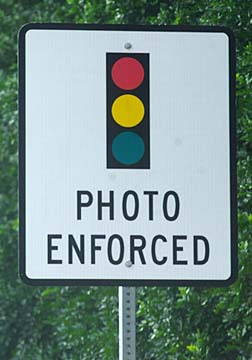


|
Speeders’ insurance Oahu vehicle owners caught speeding by the state's new traffic camera system may pay more than just a fine as auto insurance companies take the tickets into account when adjusting rates.
may rise
Insurers warn drivers that speeding
tickets issued by a new traffic camera
system could hike offenders' ratesBy Nelson Daranciang
ndaranciang@starbulletin.comSpeeding citations issued by the state Department of Transportation as part of its Photo Enforcement Program will appear on a driver's abstract and will be indistinguishable from tickets issued by police officers.
"Whatever shows up on the abstract is what we have to go by. So people have to think twice about just paying a ticket," said Carolyn Fujioka, State Farm Insurance Co. spokeswoman.
On Wednesday, the first day that actual traffic tickets were issued under the new system, the cameras caught 927 vehicles speeding, according to the state.
Veteran DUI defense attorney Paul Cunney said he thinks the Photo Enforcement Program is a bailout of the insurance companies that lost the ability to charge huge fees in insurance reform laws passed by the state Legislature since the mid-1990s.
"This is all gravy for the insurance companies. They're going to raise premiums based on a speeding ticket and checking abstracts every day," Cunney said.
It will not matter if the owner of the vehicle was not the driver who was speeding, insurance representatives said.
"If somebody else was driving your car that was caught speeding, we still have to cover the loss," said Tim Dayton, GEICO Insurance president.
Dayton said insurers can only charge enough to be able to pay out claims and make a reasonable profit.
But he said the photo citations will allow insurers to charge bad drivers more and good drivers less.
"The pie is not going to get bigger, it's just how its sliced up."
Overall, drivers could wind up paying less in insurance if photo citations reduce the number and severity of accidents, he said.
Insurers are free to assess surcharges on drivers who are cited for speeding without a corresponding drop in the premiums paid by good drivers if the company does not change its rates, said Wayne Metcalf, state Insurance Commissioner.
But Metcalf said he can require insurers to file for a rate change if he feels they are making excessive profits.
But with so many insurance companies losing money on the stock market, extra money insurers collect for speeding ticket surcharges may not amount to excessive profits, Metcalf said.
The state Traffic Violations Bureau also maintains abstracts for companies that own fleets of vehicles. However most owners of large fleets, like the state, city and Hawaiian Electric Co., are self-insured. Many have adopted strict policies to hold the drivers responsible for all citations, including those issued by cameras.
The 927 citations issued on the first day of ticketing equal more than nine times the number of speeding tickets issued by Honolulu police on an average day. In the first nine months of 2001, Honolulu police averaged 102 speeding tickets a day.
At $27 per ticket plus $5 for every mile the vehicle was traveling over the speed limit, 927 citations represent a minimum of $29,664 in fines, and likely much more.
The contractor that operates the cameras and mails the citations, Affiliated Computer Services USA, gets a percentage of every citation. The rest of the money pays for the expenses incurred by the city and the state DOT. Any interest and excess balance goes into the state's general fund, said Neal Miyahira, state budget director.
"It's a pure money grab," said Tracy Ryan of the Libertarian Party of Hawaii. The Libertarian Party is opposed to the cameras as unnecessary and is recruiting others to demonstrate against them, maybe even picket next to the cameras, said Ryan.
State officials contend the cameras are meant to reduce the number of traffic fatalities on Oahu roadways.